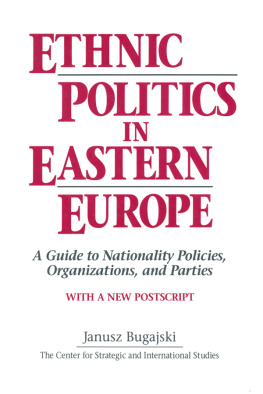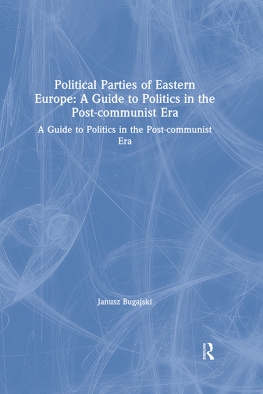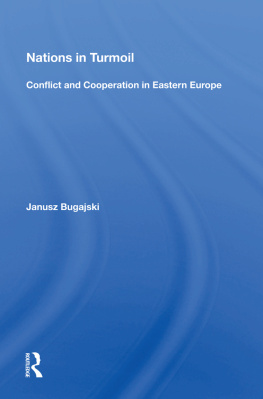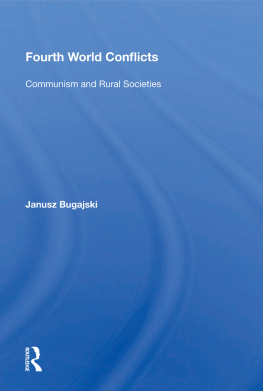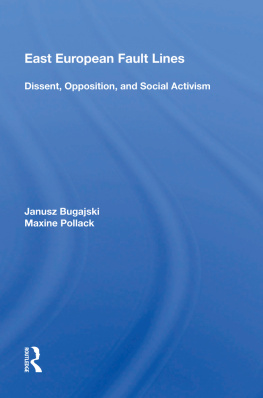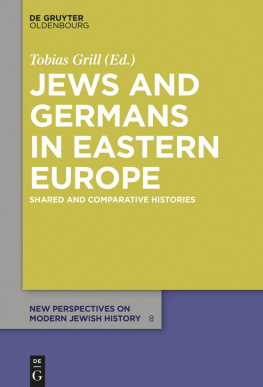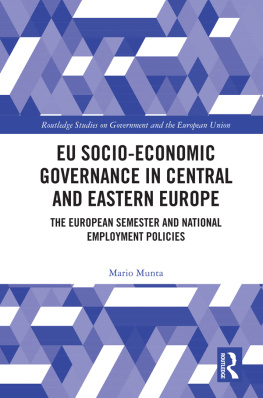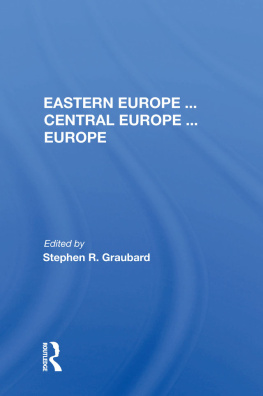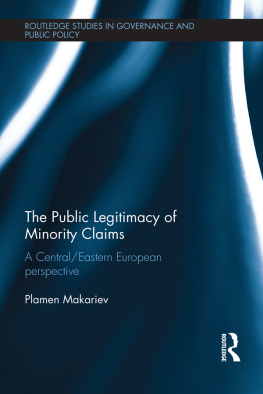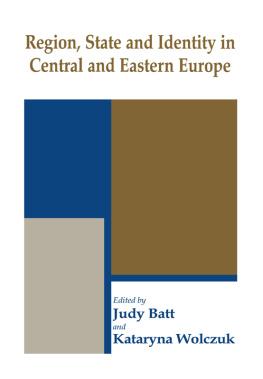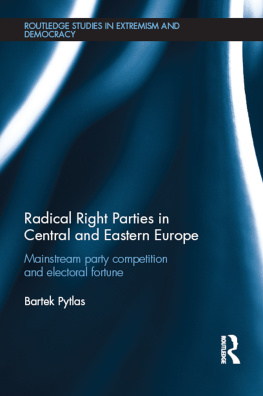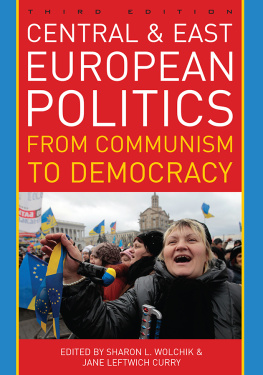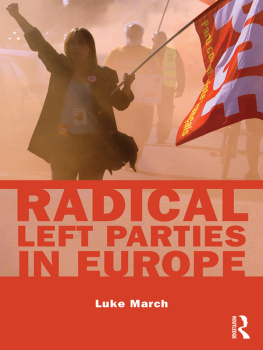E THNIC
POLITICS
IN
E ASTERN
EUROPE
E THNIC
POLITICS
IN
E ASTERN
EUROPE
A Guide to Nationality Policies,
Organizations, and Parties
WITH A NEW POSTSCRIPT
Janusz Bugajski
The Center for Strategic and International Studies
First published 1995 by M.E. Sharpe
Published 2015 by Routledge
2 Park Square, Milton Park, Abingdon, Oxon OX14 4RN
711 Third Avenue, New York, NY 10017, USA
Routledge is an imprint of the Taylor & Francis Group, an informa business
Copyright 1994, 1995 Taylor & Francis. All rights reserved.
No part of this book may be reprinted or reproduced or utilised in any form or by any electronic, mechanical, or other means, now known or hereafter invented, including photocopying and recording, or in any information storage or retrieval system, without permission in writing from the publishers.
Notices
No responsibility is assumed by the publisher for any injury and/or damage to persons or property as a matter of products liability, negligence or otherwise, or from any use of operation of any methods, products, instructions or ideas contained in the material herein.
Practitioners and researchers must always rely on their own experience and knowledge in evaluating and using any information, methods, compounds, or experiments described herein. In using such information or methods they should be mindful of their own safety and the safety of others, including parties for whom they have a professional responsibility.
Product or corporate names may be trademarks or registered trademarks, and are used only for identification and explanation without intent to infringe.
Library of Congress Cataloging-in-Publication Data
Bugajski, Janusz, 1954
Ethnic politics in Eastern Europe:
a guide to nationality policies, organizations, and parties / Janusz Bugaski.
p. cm.
Includes bibliographical references and index.
ISBN 1-56324-282-6
ISBN (pbk) 1-56324-283-4
1. Europe, EasternEthnic relations.
2. NationalismEurope.
3. MinoritiesEurope, Eastern.
4. Europe, Easternpolitics and government1989
I. Title.
DJK26.B935 1993
305.800947dc20
93-37732
CIP
ISBN 13: 9781563242830 (pbk)
ISBN 13: 9781563242823 (hbk)
__________
This book marks the completion of a long and meandering journey that began during the collapse of Communist rule in Eastern Europe. Prior to 1990, my chief focus in the region was on the burgeoning democratic dissident movements that challenged the illegitimate one-party states. The suddenness and peacefulness of the Communist downfall dramatically and surprisingly exposed the fragility of the old system. But it did not usher in the prophesied millennium of pluralism, peace, and prosperity. On the contrary, in many states it exposed much deeper fissures and tensions, often based on ethnic, religious, regional, cultural, and national differences and divisions. To a large extent, the future of Eastern Europe remains dependent on the reduction and defusion of such conflicts, which we first need to define, dissect, and understand. This volume is intended to advance the process of understanding.
My involvement in questions of ethnicity and nationalism during the past few years has been fueled by the richness and diversity of the regions societies and cultures. Such phenomena were invariably stifled by Marxist-Leninist orthodoxy but rapidly released with the new outburst of political and organizational pluralism. Post-revolutionary Eastern Europe has become a new frontier of exploration and adventure; I have spent the last three years traveling to its many corners and flashpoints, gathering material, and talking to hundreds of activists. Some colleagues have remarked that I have probably met every demagogue and loony between the Baltic and the Aegean, as well as countless numbers of rational, intelligent, and courageous personalities. In sum, I have visited Poland (May 1990, April 1991, November 1992), the Czech Republic (January 1990, June 1990, July 1991), Slovakia (June 1990, July 1991), Hungary (June 1990, November 1992), Romania (February 1992, September 1992), Slovenia (May 1992, April 1993), Croatia (August 1991, August 1992, April 1993), Bosnia-Herzegovina (November 1990, August 1992), Serbia (December 1990, May 1992, November 1992, December 1992, February 1993), Montenegro (May 1992, November 1992, February 1993), Macedonia (November 1990, May 1992), Bulgaria (January 1991), and Albania (March 1991, March 1992, July 1992, February 1993).
During these sojourns, in addition to my work for the Center for Strategic and International Studies (CSIS) in Washington, DC, I completed survey missions or political assessments for the U.S. Agency for International Development, the Department of Defense, the International Republican Institute, the Free Trade Union Institute (AFL-CIO), and the Twenty-First Century Foundation. In particular, I would like to thank my two favorite traveling companions, Mary Catherine Andrews (World Bank) and Stacey Heath (FTUI), for making my adventures even more unforgettable. It would take another chapter to list all my friends and colleagues throughout Eastern Europe, but I simply cannot omit Mjua Sever and Aimee Breslow, my soul mates and friends. Among the interns at CSIS who were closely involved at various stages of the project, and without whom the book could not have been completed, I have to mention: Anne Horvath, Sarah Despres, Kim Brinck-Johnsen, Anne Nisenson, Marianne Oglo, Nancy Oglo, Dimitri Osipov, Marek Michalewski, John Kenny, Karen Orsic, Viden Nedialkov, Augustine Arthur, Marion LeBlanc, Julie Mazur, Marisa Toso, Stoyan Radov, Sabina Neumann, Ellen Troy, Anna Sheinberg, Sarah Lang, Karl Laskas, Zarmineh Rab, Philip Johnston, Kathleen Avvakumovits, and, of course, Jan Tisnado. In particular, my warmest gratitude must go to Anne Truslow and David Augustyn, my irreplaceable research assistants at CSIS who kept the home fires burning while I wandered along the Eastern Front.
__________
The strength of a primordial attachment is that emotional cohesion derives not only from some minor consciousness of kind, but from some external definition of an adversary as well. It was once hoped that the politics of ideology might be replaced by the politics of civility, in which men would learn to live in negotiated peace. To replace the politics of ideology with the politics of ethnicity might only be the continuation of war by other means.
Daniel Bell1
The 1990s will long be remembered as the springtime of ethnicity in Eastern Europe. After four decades of Marxist-Leninist uniformity, statist centralism, and enforced socialist internationalism, a dramatic ethnic, cultural, and political reawakening accompanied the disintegration of Soviet domination and Communist rule at the close of the 1980s. Moreover, a number of new states emerged from the defunct multi-national federations of Yugoslavia and Czechoslovakia, with several confronting further territorial and sub-regional divisions. An upsurge of ethnically based politics has been evident alongside the burgeoning of political pluralism and the erosion of central state controls. After nearly half a century of dormant or disguised nationalism, virtually all the East European states have been profoundly racked by ethnic, regionalist, and autonomist movements demanding some degree of political self-determination, a stake in national decision making, and more equitable economic redistribution. Both majority and minority populations have been affected by this rebirth of ethnicity, and in some cases the programs and goals of different national communities have clashed, resulting in manifestations of conflict that threatened to derail the further progress of democratic reform.

